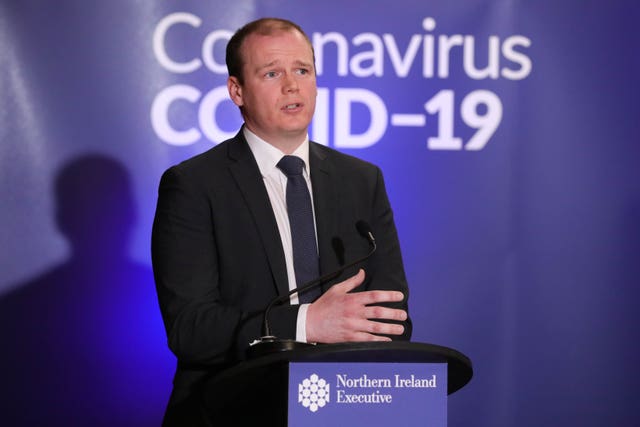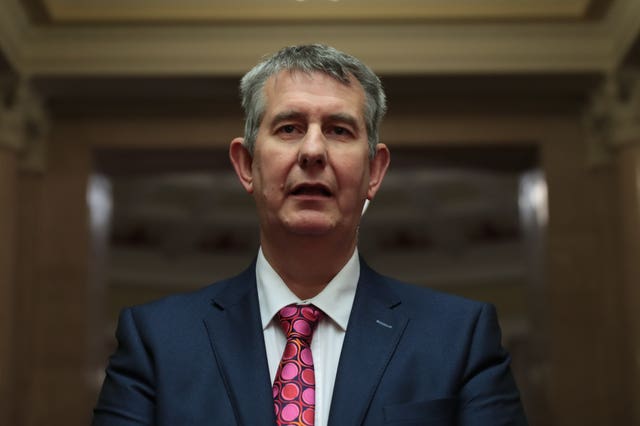Northern Ireland’s Agriculture Minister has halted construction of permanent inspection facilities for post-Brexit checks on agri-food goods arriving from Great Britain.
DUP minister Gordon Lyons has also stopped further recruitment of inspection staff for the port facilities and said charges would not be levied at the ports on traders bringing goods from GB into Northern Ireland.
Ongoing Irish Sea trade checks, which are taking place at existing repurposed port buildings and other temporary facilities, will continue.
Mr Lyons’s decision relates to ongoing work on new purpose-built inspection facilities at ports like Belfast and Larne.
Sinn Fein deputy First Minister Michelle O’Neill branded the move a “stunt”.
SDLP Infrastructure Minister Nichola Mallon questioned whether Mr Lyons could take the decisions without wider approval of the Stormont Executive.
She, along with Sinn Fein Finance minister Conor Murphy and Alliance Justice minister Naomi Long, wrote to executive colleagues on Friday evening demanding an emergency meeting following the DUP minister’s actions.

It remained unclear on Friday night when such a meeting might be convened as Stormont officials sought legal advice on whether Mr Lyons was able to act unilaterally on the matter.
There was an expectation that a meeting could be called over the weekend.
Going public with his decision on Friday evening, Mr Lyons told the PA news agency: “I’ve just let executive colleagues know that today I instructed my department to halt work on a range of issues relating to work at the ports.
“This is in and around a number of areas, first of all further infrastructure, any further infrastructure builds; the additional recruitment of staff; and also the charging at the ports.”
The decisions come amid the ongoing controversy over disruption caused by the Northern Ireland Protocol, which governs Irish Sea trade post-Brexit.
Unionists are angry at the protocol’s requirement for checks on many goods entering Northern Ireland from the rest of the UK.
They claim it has driven an economic wedge between the region and Great Britain, and has undermined the Union as a result.
Mr Lyons said his move was in response to the “practical difficulties” caused by the protocol.
He cited uncertainty over the movement of goods when grace periods currently limiting protocol bureaucracy end at the start of April.
“It’s real nightmare for us and it’s going to be causing us an awful lot of problems,” he said.
Previously, when the former DAERA Minister took a similar stance, his Permanent Secretary took forward the Executives responsibilities. The Protocol is a consequence of Brexit. The DUP championed Brexit & must own the consequences. Business and society need certainty, not stunts.
— Michelle O’Neill (@moneillsf) February 26, 2021
Mr Lyons’s Department of Agriculture, Environment and Rural Affairs has been fulfilling the UK Government’s legal duty to construct the facilities under the terms of the Brexit Withdrawal Agreement’s Northern Ireland Protocol.
The minister’s predecessor and DUP colleague Edwin Poots had also attempted to halt construction last year but stepped back from that position due to the legal obligations.
Mr Poots instead distanced himself from the work and his senior officials took on responsibility for fulfilling the protocol obligations.
It remained unclear on Friday night whether officials would again be required to proceed without Mr Lyons’s approval.
Mr Lyons cited UK domestic legislation – in the form of the Internal Market Act – in arguing he has “legal duty” to stop the work.
He said that law compelled him to always act with special regard to Northern Ireland’s place within the UK’s internal market.
Asked about his obligation to fulfil the UK’s responsibilities under the Brexit international treaty, Mr Lyons insisted he was acting in a “reasonable and proportionate” manner in response to the uncertainty around the protocol.
The minister highlighted that the UK Government had acknowledged there were problems with the trading arrangements.
“I think this is a reasonable and proportionate step to take,” he said.
The Executive must urgently meet this evening following the alarming memo & solo run by the DUP's Agriculture Minister. pic.twitter.com/zHPokPpAlm
— Nichola Mallon (@NicholaMallon) February 26, 2021
Mr Lyons said his officials have been warning him that the port control posts are unlikely to cope when the grace period exempting retail agri-food goods from EU export health certification ends on March 31.
He said supply chains into Northern Ireland were also unlikely to be able to hold up when the regulatory red tape increases in April.
“The risk to Northern food supply in those circumstances will remain high so there’s a lot of practical difficulties with all of this and that’s causing us a huge amount of uncertainty,” he said.
The minister told PA there was need for the UK and EU to find “permanent solutions” to the issues caused by the protocol.
“It’s a real concern to us heading towards the end of the grace period, so we need that certainty from the EU and the UK,” he said.

Ms O’Neill criticised the move.
“Previously, when the former DAERA Minister (Mr Poots) took a similar stance, his Permanent Secretary (Denis McMahon) took forward the Executive’s responsibilities,” she tweeted.
“The Protocol is a consequence of Brexit. The DUP championed Brexit & must own the consequences. Business and society need certainty, not stunts.”
Ms Mallon tweeted: “Following the deeply concerning memo from DUP Minister @gordonlyons1 on the ports, I have written to Executive colleagues calling for an urgent meeting of the Executive this evening. This decision is controversial, cross cutting & cannot be put into effect without Exec agreement.”
Mr Lyons said the protocol needed to go.
“My own point of view is I think the protocol needs to be scrapped, it is not working,” he said.
“The evidence we have so far shows it’s not working and it’s only going to get worse at the end of the grace period.”
In response to the developments, a UK Government spokesman said: “This is a matter for the Northern Ireland Executive.
“We remain in close contact with them.”




Comments: Our rules
We want our comments to be a lively and valuable part of our community - a place where readers can debate and engage with the most important local issues. The ability to comment on our stories is a privilege, not a right, however, and that privilege may be withdrawn if it is abused or misused.
Please report any comments that break our rules.
Read the rules hereLast Updated:
Report this comment Cancel